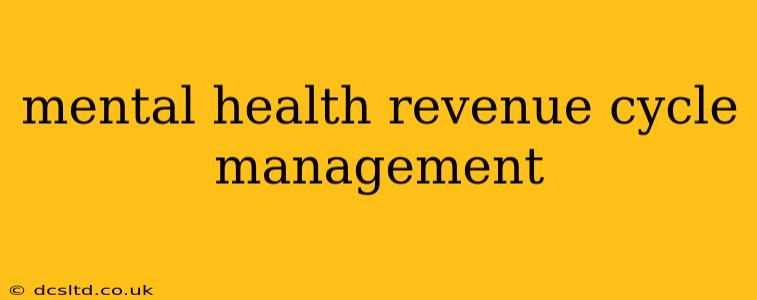The mental healthcare industry faces unique challenges in revenue cycle management (RCM). Unlike many other medical specialties, mental health services often involve longer treatment plans, diverse insurance coverage complexities, and a higher prevalence of patients with limited financial resources. Effective RCM is crucial not only for the financial sustainability of mental health practices but also for ensuring access to vital care. This comprehensive guide delves into the key aspects of optimizing mental health RCM, addressing common hurdles and offering strategic solutions.
What is Mental Health Revenue Cycle Management?
Mental health revenue cycle management encompasses all administrative and clinical processes involved in capturing, managing, and collecting payments for services rendered. This includes everything from patient intake and insurance verification to billing, coding, claims submission, and accounts receivable management. A well-oiled RCM system ensures that providers receive timely reimbursements while minimizing denials and maximizing revenue. This allows them to reinvest in their practices, improving facilities, hiring staff, and ultimately, enhancing the quality of patient care.
How Does Mental Health RCM Differ from Other Specialties?
Several factors distinguish mental health RCM from other healthcare specialties:
- Varied Payment Models: Mental health services might be reimbursed under various models, including fee-for-service, capitation, and value-based care, each requiring distinct billing procedures and documentation.
- Complex Insurance Navigation: Navigating insurance complexities, particularly with managed care organizations and Medicaid/Medicare, is often more intricate for mental health services due to varying coverage levels and authorization requirements.
- Higher Rates of Uninsured/Underinsured Patients: A significant portion of individuals seeking mental healthcare may lack adequate insurance coverage, requiring alternative payment arrangements or charity care. This necessitates robust financial assistance programs and flexible payment options.
- Lengthy Treatment Plans: Unlike acute medical procedures, mental health treatment typically involves ongoing sessions over extended periods, demanding meticulous tracking of visits and accurate billing for each service.
- Documentation Requirements: Comprehensive and accurate clinical documentation is paramount for successful claims processing. Mental health professionals must meticulously document each session, including diagnoses, treatment plans, and progress notes, adhering to strict coding guidelines.
What are the Common Challenges in Mental Health RCM?
Many mental health practices face significant challenges in RCM:
- High Denial Rates: Inaccurate coding, incomplete documentation, and lack of pre-authorization can lead to high denial rates, delaying reimbursements and impacting profitability.
- Delays in Reimbursements: Slow payment cycles from insurance payers can create cash flow issues for practices, hindering their ability to meet operational expenses.
- Lack of Automation: Manual processes are often time-consuming and prone to errors, leading to inefficiencies and increased administrative costs.
- Staff Shortages: Finding and retaining qualified billing and coding specialists can be a significant challenge in the mental health industry.
How Can I Improve My Mental Health Practice's RCM?
Implementing these strategies can significantly enhance RCM efficiency and profitability:
- Invest in Technology: Employing advanced billing software, electronic health records (EHRs) with integrated billing capabilities, and claims management systems can automate many processes, reducing errors and improving efficiency.
- Streamline Workflow: Develop standardized procedures for patient intake, insurance verification, coding, billing, and claims follow-up.
- Enhance Staff Training: Provide comprehensive training to staff on proper coding, billing, and documentation practices, emphasizing compliance with industry regulations.
- Implement Robust Denials Management: Develop a system for identifying and addressing denials promptly, minimizing revenue loss and improving reimbursement rates.
- Prioritize Patient Communication: Clearly communicate billing policies and payment options to patients, proactively addressing any financial concerns or questions.
- Consider Outsourcing: Outsourcing certain RCM functions, such as billing and coding, to specialized healthcare revenue cycle management companies can free up internal staff to focus on patient care.
How Can I Reduce Denials in Mental Health Revenue Cycle Management?
Reducing denials is crucial for financial health. Key strategies include:
- Accurate Coding: Ensure that all services are accurately coded using the appropriate Current Procedural Terminology (CPT) and International Classification of Diseases (ICD) codes.
- Complete Documentation: Maintain comprehensive and accurate clinical documentation for each session, including diagnoses, treatment plans, and progress notes. This supports the medical necessity of services and ensures proper reimbursement.
- Pre-Authorization: Obtain necessary pre-authorizations from insurance payers before providing services, whenever required.
- Regular Audits: Conduct regular internal audits of billing and coding practices to identify and correct errors proactively.
What are the Key Performance Indicators (KPIs) in Mental Health RCM?
Monitoring KPIs provides insights into RCM performance and areas for improvement:
- Clean Claim Rate: The percentage of claims submitted without errors that are processed and paid on the first attempt.
- Denial Rate: The percentage of claims denied by insurance payers.
- Days in Accounts Receivable (AR): The average number of days it takes to collect payment from insurance payers.
- Net Collection Rate: The percentage of charges collected after accounting for denials and adjustments.
Effective mental health revenue cycle management is not simply about maximizing revenue; it’s about ensuring the financial stability of practices so they can continue providing high-quality care to patients in need. By implementing the strategies outlined above, mental health providers can optimize their RCM processes, improve financial performance, and ultimately, enhance the lives of their patients.
